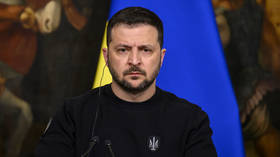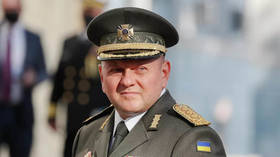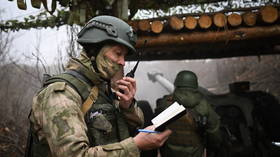Sergey Poletaev: Here's the reason why next year's Ukrainian elections have been cancelled
Washington doesn’t know what to do with Kiev, so Zelensky will remain in power

Back in October, it seemed that Vladimir Zelensky’s days as president were numbered. Time magazine and other publications accused Ukraine’s leader of being responsible for failures at the front. He was described as having lost touch with reality, being unwilling to negotiate, with increasingly dictatorial and narcissistic tendencies, and so on. Prior to that, some prominent figures in the West had stressed the need to hold presidential elections in Ukraine exactly on time – in March 2024. This was mentioned by US Senator Lindsey Graham, who visited Kiev in the early fall.
Now, despite the fact that the media keeps publishing stories about the deplorable state of affairs in Ukraine, it looks like Zelensky will remain in power. In early November, the spokesperson for the US Department of State said that the Ukrainian constitution allows the country to cancel elections, and, on November, 30, all factions and groups of the Ukrainian parliament agreed that elections should be put off for as long as martial law remains in effect, plus for an additional six months after it is lifted.
What does all this mean? Is this the result of Zelensky’s skilled politics or a trap into which he voluntarily fell? Or else, is it an indicator of Washington’s political paralysis on the Ukrainian front?
Post-Azov stupor
A year ago, trusting in their omnipotence, Ukraine and the West anticipated Russia’s inevitable defeat on the battlefield. Vladimir Zelensky personified this confidence, which culminated in the Ukrainian Armed Forces’ (AFU’s) counteroffensive in the direction of the Azov Sea. However, the AFU’s failure in the summer and fall of this year was not just a military defeat – it demonstrated the failure of Ukraine’s entire post-Soviet policy, which has been actively supported by the West.
After such a fiasco, one would think Ukraine might fancy a change of leadership. So, why does Zelensky remain in office?
It looks like the most obvious answer to this question is also the most probable one – the West does not know what to do. In order for a new person to replace Zelensky, Ukraine needs a new strategy, which it doesn’t have. Western elites who went all in on the illusory idea of Russia's military defeat are now at a loss and face a bunch of new problems: the conflict in the Middle East, far-right parties gaining support in Europe, and the political paralysis ahead of the US elections. After all, no one is quite certain that Joe Biden, whose health is deteriorating with each day, will be able to run for another term.
It is important to remember that Washington has no need for Ukrainian elections as such, it just needs to keep a tight grip on Kiev. It’s true that Zelensky started to get out of control – he imagined himself to be a great military commander, lost his head, and started throwing tantrums in public, like at the NATO summit in July. The US understands that something has to be done, since a mentally unbalanced head of state is dangerous and unpredictable.
However, as of now, the US Department of State cannot orchestrate a change of power in Ukraine, particularly since Ukraine’s ‘prima donna’ refuses to leave the stage.
In the absence of a clear strategy, keeping Zelensky in office seems like the lesser of two evils – if political chaos were to break out in Ukraine, it would inevitably impact the Democrats’ ratings during the upcoming elections, but if everything stays as is, the issue could be swept under the rug for the time being. Moreover, if the current administration manages to convince Congress to approve a minimum aid package for Ukraine, it would consider the job done.
The lame duck
There is another important aspect, however. An increasing number of people both in Ukraine and in the West realize that the coming year will be a lot more difficult for Kiev. The consequences of the fatal decisions made by Zelensky in the past two years will become fully evident – from the refusal to conclude a peace agreement in Istanbul, to the meaningless fight for Bakhmut, the failed counteroffensive, and other battles that resulted in heavy losses.
Zelensky was the one who ‘embodied’ these decisions, and many people want him to suffer the consequences, so that all the negativity will be buried alongside the president when he descends into the political grave. But, for now, while Ukraine can still fight, the West wants it to fight with Zelensky in charge.
In this respect, the country’s current president is following the path of his predecessors – it has become traditional in Ukraine to heap all the guilt on the leader and then push him into oblivion. This means that soon, everyone in Ukraine may unite against Zelensky. Even his own party is involved in the game. In a recent interview, head of the Servant of the People faction David Arakhamia admitted that, in March 2022, Kiev had the chance to conclude a peace agreement on very favorable terms and without spilling so much blood – in other words, he was accusing Zelensky of failing to ensure peace.
The conflict between the president and the country’s military leadership is also growing – in a number of interviews and articles, AFU Commander-in-Chief Valery Zaluzhny has basically admitted that Ukraine’s army is in a hopeless situation and made it clear that Zelensky’s interference in military matters is to blame. This accusation is quite serious, since the AFU has the full support of Ukrainian society, and Zaluzhny, who is not afraid to speak the truth, may use the army’s popularity to boost his own rating.
Other Ukrainian political figures have also come out of the shadows and reached out towards the West. Zelensky, however, is trying to thwart such attempts. For example, on Friday morning, it became known that former Ukrainian President Pyotr Poroshenko, who was reportedly on his way to Washington to meet with the new speaker of the US House of Representatives, was not allowed out of the country. Either way, it looks like Ukraine’s entire beau monde is ready for the new political season, which may last anywhere from six months to two years, and will probably end in Zelensky’s quiet (or maybe not so quiet) resignation, and a successor who will promise to fix everything and clean up Ukraine’s ‘Augean stables’.
Maybe the new president will even agree to a truce, and Ukrainian society, tired of the war, will accept this fact – perhaps without enthusiasm, but with a sigh of relief. And then, everything will go back to normal, and Ukraine will prosper and will surely join NATO and the European Union.
An elephant in the room
All these daydreams, however, are unrealistic since they completely ignore Russia’s position. For some reason, Ukraine thinks of Russia as a passive entity that will silently accept any proposal– such as agreeing to a truce without any commitments on the part of Ukraine, freezing the conflict, or allowing Ukraine to join NATO.
Russia, however, will agree to such conditions only if its military potential is exhausted and it is unable to continue fighting. In the nearest one or two years, such a scenario is highly improbable. On the contrary, most likely Russia’s army will be in its best shape for the 2024 campaign, while Ukraine’s forces will continue to grow weaker.
No one knows whether this will suffice to completely defeat Ukraine in the coming year, but some smart Ukrainian experts have already said that the country has no chance of winning even the current war of attrition.
This means that Zelensky’s successor will not merely inherit some ‘negativity’, which could be swept aside with the help of political manipulation – he will take over a country in catastrophic condition. And this national catastrophe will also bring down Ukraine’s current political elites, who hope to profit from Zelensky’s mistakes.
Perhaps then, Ukraine will finally be governed by leaders who are concerned about their country – who want to save what is left of it, defend national interests, not Western ones, and who will stop turning Ukraine into an ‘anti-Russia’.
https://www.rt.com/russia/588361-ukranian-elections-cancelled-us/





0 Comments:
Post a Comment
Subscribe to Post Comments [Atom]
<< Home